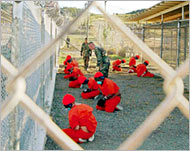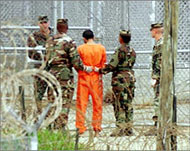Experts: Guantanamo claims credible
UN human rights experts seeking to visit Guantanamo’s prison say they have reliable accounts of detainees there being tortured.

The four independent experts on Thursday said the United States had not responded to their requests to check on the conditions of terror suspects at the US naval base in Cuba, as well as US detention centres in Iraq, Afghanistan and other places.
They said their request for a visit was “based on information, from reliable sources, of serious allegations of torture, cruel, inhuman and degrading treatment of detainees, arbitrary detention, violations of their right to health and their due process rights”.
“Many of these allegations have come to light through declassified (US) government documents,” they said.
A US spokeswoman said the request was still being reviewed in Washington.
“We are all worried about this situation,” Leandro Despouy of Argentina, specialist on the independence of judges and lawyers, told reporters in Geneva.
The expert on torture, Manfred Nowak of Austria, said, “We are not making a judgment if torture or treatment under degrading conditions has taken place.”
Response
 |
|
The experts have received |
However, he said, the failure of the US to respond is leading the experts to conclude that Washington has something to hide.
“At a certain point you have to take well-founded allegations as proven in the absence of a clear explanation by the government.”
Nowak said the experts have received a number of allegations about abuse of US detainees.
The experts, who report to UN bodies on human rights issues, said they had yet to hear from Washington on their latest request – made a year ago and renewed in mid-April – to visit the detention facility.
The UN human rights investigators have been trying to visit Guantanamo since early 2002.
Nowak said in a meeting in April that US officials refused to guarantee him the right to speak to detainees in private – an “absolute precondition” for such a visit.
Full access
Nowak said his team would need full access to the facilities and the prison population.
 |
|
Full access to the camp is needed, |
“We deeply regret that the government of the US has still not invited us to visit those persons arrested, detained or tried on grounds of alleged terrorism or other violations,” said the statement from the experts.
“The time is up. We have to act now,” said Leila Zerrougui of Algeria, a specialist on arbitrary detention.
“If not, we won’t have any credibility left.”
Paul Hunt of New Zealand, who monitors physical and mental health, said he wanted to investigate in person “persistent and credible reports” of alleged violations.
“Reportedly medical staff have assisted in the design of interrogation strategies, including sleep deprivation and other coercive interrogation methods,” said Hunt.
Misgivings
The experts said they decided to express their misgivings because “the lack of a definitive answer despite repeated requests suggests that the US is not willing to cooperate with the United Nations human rights machinery on this issue.”
Brooks Robinson, spokeswoman for the US mission to UN offices in Geneva, said the response had been delayed because of the United States‘ review process.
|
“The writ of international human rights does not stop at the gates of Guantanamo Bay” Paul Hunt, |
“It is true there is no answer yet to their request, but the main point is that their request is being addressed and discussed and reviewed in the US,” said Robinson.
“That process is under way in response to this request,” she added, noting that US officials have consistently denied violating the principle of humane treatment of detainees in the war on terror.
The experts said no country is above international human rights law.
“The writ of international human rights does not stop at the gates of Guantanamo Bay,” said Hunt.
US officials have allowed only the International Committee of the Red Cross to visit detainees at Guantanamo, which began being used as a detention centre for terror suspects with the arrival of the first alleged Taliban and al-Qaida members brought from Afghanistan in early 2002.